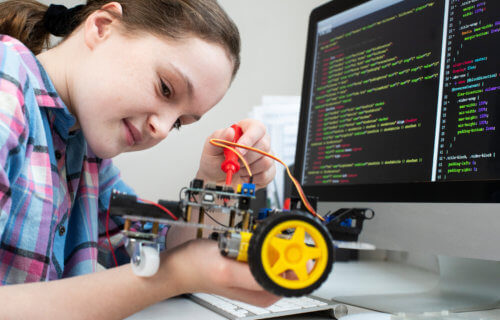SEATTLE — Kids as young as six believe that girls aren’t interested in computer science and engineering, according to recent research. The study shows that these worrying stereotypes can extend into the late teens, contributing to the gender gap in STEM education.
Researchers set out to explore the gender-based beliefs young children and teens have about subjects in science, technology, engineering, and mathematics (STEM). They report that the majority of children that were questioned believe that girls are less interested than boys in computer science and engineering.
“Gender-interest stereotypes that STEM is for boys begins in grade school [primary school] and by the time they reach high school [secondary school], many girls have made their decision not to pursue degrees in computer science and engineering because they feel they don’t belong,” says study lead author Allison Master, an assistant professor of Psychological, Health and Learning Sciences at the University of Houston, in a statement.
Master and her team decided to build on previous research that looked into stereotypes surrounding a person’s ability to do something, so they focused on a person’s interest. By looking at interest, they were able to learn how gender-driven stereotypes about who likes — not just who is “good” at — computer science and engineering, can affect a child’s sense of belonging and willingness to participate. According to the researchers, these stereotypes can influence a young person’s long-term motivation, which can deter them from trying an activity or taking a class they’re truly interested in.
National statistics recorded in 2019 reveal that women are underrepresented in popular and lucrative STEM careers. Data from the U.S. Census Bureau shows that only about 25 percent of computer scientists and 15 percent of engineers are women. Similar statistics are reflected across the pond in the UK. According to the recent data provided by the Higher Education Statistics Agency, 35 percent of STEM students in higher education are women.
Polling children on their beliefs about girls and STEM courses
The study involved analyzing data from four different sub-studies, which included a mixture of surveys and designed experiments to capture the beliefs of a racially diverse sample of children and teenagers from age five to 18 in the U.S. education system. In the first two studies, researchers surveyed more than 2,200 children and teens to understand their beliefs about computer science and engineering.
The surveys used terms and phrases that the students were familiar with at school, such as “computer coding” for computer science. For engineering, phrases included things like “designing and creating large structures such as roads and bridges.”
Results show that just over half of the kids believed girls are less interested than boys in computer science, and nearly two-thirds said girls are less interested in engineering. In comparison, 14 percent of the children questioned said girls are more interested than boys in computer science, while nine percent felt that girls are more interested in engineering.
The team then gave a smaller sample of children the opportunity to choose two different activities to participate in.
Researchers say that the girls were significantly less interested in a computer science-related activity when told that boys were more interested than they were. In this instance, only 35 percent of the girls chose to participate in the computer science-related task. Conversely, when they were all informed that boys and girls were equally interested in taking part, 65 percent of girls jumped at the chance at participating.
“While the surveys showed the pervasiveness of gender-based stereotypes around interest in computer science and engineering, the designed experiments demonstrated how stereotypes can affect a sense of belonging, which can influence motivation,” explains co-author Andrew Meltzoff, a professor of psychology at the University of Washington. “The large surveys told us that the kids had absorbed the cultural stereotype that girls are less interested in computer science and engineering.
“In the experiments, we zeroed in on causal mechanisms and consequences of stereotypes,” continues Meltzoff, who is also the co-director of the Institute for Learning & Brain Sciences at the university. “We discovered that labelling activity in a stereotyped way influenced children’s interest in it and their willingness to take it home—the mere presence of the stereotype influenced kids in dramatic ways. This brought home to us the pernicious effect of stereotypes on children and teens.”
Girls may not aspire to be scientists ‘if fewer feel they belong’
The research team concludes that both teachers and parents can lend a hand in helping to stifle these unhelpful stereotypes by encouraging girls’ participation and reinforcing their belonging in the subjects. They also noted that the education system should offer all students high-quality computer science and engineering courses early on in their education.
“And that’s important because if fewer girls feel they belong, then fewer might pursue computer science or engineering through school and beyond. That can lead to gender disparities in STEM fields and even worsen the wage gap. Current gender disparities in computer science and engineering careers are troubling because these careers are lucrative, high status, and influence so many aspects of our daily lives,” says co-author Sapna Cheryan, a professor of psychology. “The dearth of gender and racial diversity in these fields may be one of the reasons why many products and services have had negative consequences for women and people of color.”
The study is published in the Proceedings of the National Academy of Sciences.
South West News Service writer Georgia Lambert contributed to this report.

I grew up in 1990s, I didn’t get a computer till I was 14. Even if internet was around I didn’t use it much.